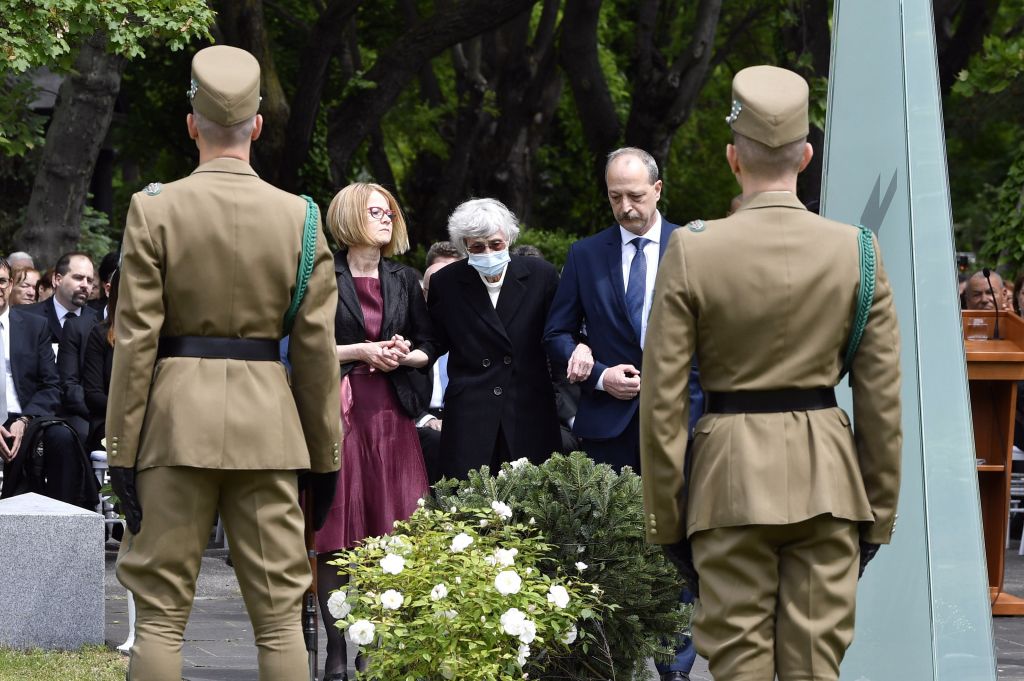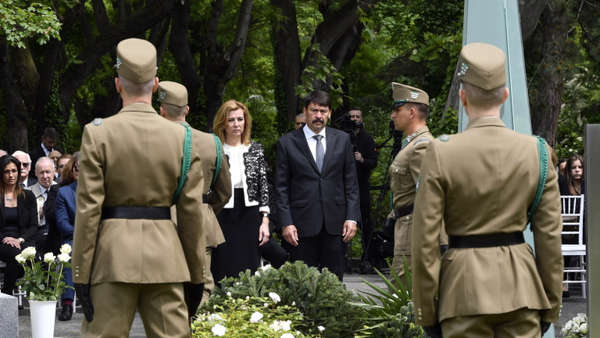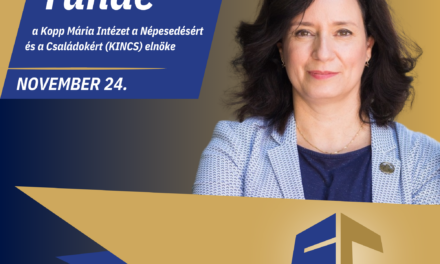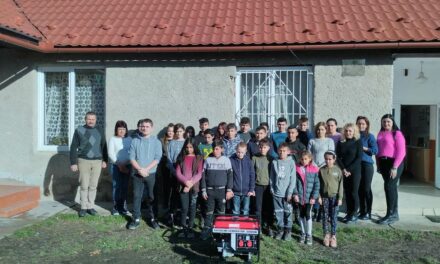President Ferenc Mádl had the country's esteem as his own, President János Áder pointed out at the wreath-laying ceremony in Budapest on Saturday on the occasion of the 10th anniversary of the death of the late head of state Ferenc Mádl.
Ferenc Mádl never longed for the immortality achieved by spectacular success. He worked not for eternity, but for the eternal. "Therefore, in his value system, there was perfect order. He knew exactly that it is only worth building on rock. He won the love and respect of the people with this moral firmness, this attitude free from ostentation," said the head of state.
At the event organized by the National Heritage Institute in the Fiumei út cemetery, at the grave of former President Ferenc Mádl, János Áder emphasized: Ferenc Mádl was able to serve the public good "like the greatest men of the reform era or the period after the compromise". That's why he undertook what others thought he was suitable for, "as the president of the republic, he became the nation's conscience", said the head of state.
János Áder emphasized: "Ferenc Mádl knew what was important, what was essential", where the emphasis was, what should be in the center. His answer: "to be human first and foremost." Straight, authentic. "This is the only way he will become a good student, a good teacher, a good lawyer, a credible scientist, a credible minister or even a good and credible president of the republic," he said.
"Ferenc Mádl knew that the truth is more important than appearances, that a person is justified only by his actions. Above all, the moral attitude", continued János Áder, adding: "and there is absolutely no need to conform to the rapidly changing public taste".
According to the head of state, Ferenc Mádl remained the same as he always was: "an educated citizen, a respected teacher, a solid character. Even when the law did not protect the person and the community, but an unjust system corrupted to the core, and also later, when it was necessary to deal with the bitterness of the great transformation and to re-create legal security, and also when it was necessary to accept the obvious defeat , because it was more important then than choosing the comfort of being an outsider," he explained, noting that it would have been easier for him to reject public service, referring to his work as a university scientist, than to accept and undertake it.
János Áder highlighted: For Ferenc Mádl, the scientific career gave him all the success and all the personal benefits "that a creative person could wish for". He didn't need it, he didn't need it, to stand as a politician, to take on the "often harsh publicity of public life". "Ferenc Mádl was a wise man, a good and noble soul, one of the greatest," declared the head of state.

On behalf of the Mádl family, Dalma Mádl, widow of the former President Ferenc Mádl, András Mádl, son of the late head of state, and associate professor Judit Mádlné Szőnyi will lay a wreath at the grave of Ferenc Mádl on the occasion of the 10th anniversary of the death of the late head of state at a commemoration combined with a wreath laying in the National Cemetery on Fiumei Street in Budapest in 2021. on May 29. Academician Ferenc Mádl, who was the President of the Republic of Hungary between 2000 and 2005, died on May 29, 2011, at the age of 81. MTI/Zoltán Máthé
János Áder recalled that Ferenc Mádl always proudly talked about what he got from his family and only spoke very modestly about what he himself contributed. "The strength of character and life-organizing principles are not only inherited by man," declared the head of state, adding that Ferenc Mádl also gathered a sense of vocation, love of humanity, and goodwill.
"This is how he became a citizen of the world in science as a man born in a village who knew the power of manual work. As a Hungarian, he is European. A free man in a strong community. A lawyer who enforces morality in the law. Even as a politician, he is a true to the point scientist. Even as president, he is a polite and considerate person," the head of state praised Ferenc Mádl. János Áder recalled that 21 years ago, when Ferenc Mádl became president of the republic, in his inaugural speech he wished the Hungarians such seemingly simple things as "smiles, bigger and better bread, easy dreams".
"Even in the moments of Ferenc Mádl's inauguration as president, the eternal teacher spoke to us," said János Áder, explaining: "he wanted to show that there is hope, that every new generation is right to trust in its own strength, that it is not so impossible to make a miracle. Because if we help ourselves, God will also help us".
Quoting the words of the writer András Sütő, János Áder said: "History, no matter how much it is the work of the masses, - still - walks into the house of memory on the arm of an outstanding personality". "Ferenc Mádl was just such an outstanding personality", declared the head of state, adding: "it has been ten years since we have been without his honorable presence, but his beloved person has an eternal place in the house of our memory".
Among others, Anita Herczegh, wife of János Áder and Dalma Mádl, widow of Ferenc Mádl, as well as László Kövér, President of the Parliament, András Zs. Varga, President of the Curia, Cardinal Péter Erdő, Archbishop of Esztergom-Budapest attended the wreath-laying ceremony held in the Fiumei út cemetery. , former Prime Minister Péter Boross, Minister of Justice Judit Varga, László Domokos, President of the State Audit Office, Attila Péterfalvi, President of the National Data Protection and Freedom of Information Authority, Prime Minister's Commissioner Mariann Vízkelety, President of the Hungarian Civil Cooperation Association and Gábor Móczár, National Heritage Institute Trustee director general. The commemorators were greeted by Lajos Vékás, a university professor at ELTE's Faculty of Political Science and Law.
After the ceremony, the Ferenc Mádl memorial exhibition entitled "The Elegance of Appearance and Thought" was opened at a limited event in the Museum of National Remembrance. The exhibition can be viewed until August 20, in compliance with the current epidemiological rules.
Source: vasarnap.hu













